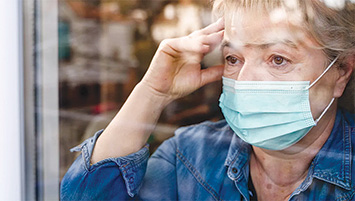Why unvaccinated people are feeling the brunt of the Omicron surge
 As the Omicron variant surges throughout the United States, people with COVID-19 who are unvaccinated are developing more severe illness and dying in greater numbers than those vaccinated.
As the Omicron variant surges throughout the United States, people with COVID-19 who are unvaccinated are developing more severe illness and dying in greater numbers than those vaccinated.
Dr. Mohammad Sobhanie, an infectious diseases physician at The Ohio State University Wexner Medical Center, said Omicron has replaced Delta as the dominant variant of COVID-19 in the United States.
“It is transmitted a lot easier than the Delta variant, and this has led to more infections nationwide,” he said.
In addition to Omicron being more transmissible, there has been an overall relaxation of mitigation efforts, said Sobhanie.
This includes masking when indoors and practicing physical or social distancing.
“This, combined with the emergence of the more transmissible Omicron variant, has led to a surge, which has surpassed the Delta variant,” he said.
Dr. Faheem Younus, vice president/chief quality officer/chief of Infectious Diseases at the University of Maryland Upper Chesapeake Health, also noted that about 40 percent of the country isn’t fully vaccinated, and only 36 percent of the population has received a booster dose.
“Furthermore, this surge coincides with holidays,” said Younus. “Travel and communal activities associated with such times fuel more cases.”
UNVACCINATED BEARING BRUNT OF THE SURGE
As it has been since the arrival of the COVID-19 vaccines, the virus is affecting the unvaccinated more than the vaccinated.
In a Nov. 22 White House press briefing, Dr. Rochelle Walensky, director of the Centers for Disease Control and Prevention (CDC), said unvaccinated people are about six times more likely to test positive than vaccinated people, nine times more likely to be hospitalized, and 14 times more likely to die from COVID-related complications.
At that time, the Delta variant dominated when Walensky made the statement.
How have things changed now that Omicron has taken over?
It’s still early in the Omicron surge. Still, most hospitals are stretched beyond capacity, Younus said, and some — including his hospital system — are now operating under crisis standards of care.
“More than 75 percent of all hospitalized COVID-positive patients in the University of Maryland Medical System’s 12 hospitals are unvaccinated,” said Younus. “A majority of the remaining 25 percent have received only 1 or 2 shots.”
Younus added that this wave is “dramatically worse” than Delta.
However, because of improved treatments, the overall mortality for COVID-19 has gone down since the beginning of the pandemic.
In addition, breakthrough infections tend to be milder, according to S. Wesley Long, PhD, a researcher at Houston Methodist Hospital in Houston.
“With Delta, we saw 43 percent of patients needing to be hospitalized while just over five percent died. With Omicron, although it is still early, we are seeing just under 15 percent of patients need hospitalization, and thus far, just under one percent have died,” said Long.
WHY IT’S BEST TO GET VACCINATED
Some have questioned whether the vaccines are worth it since they do not entirely prevent the disease or its transmission to others.
But the purpose of vaccines is not to completely prevent infections, says Dr. Greg Schrank, MPH, hospital epidemiologist at the University of Maryland Medical Center, specializing in Infectious Diseases, and assistant professor of medicine at the University of Maryland School of Medicine.
This would require maintaining very high levels of antibodies in our blood at all times through frequent boosting.
Instead, the vaccines’ primary purpose is to prevent severe outcomes, which they are quite good at.
The vaccines are also doing a good job of slowing down the transmission of the virus, Schrank said.
“This is because vaccinated people shed lower amounts of virus for a shorter amount of time,” he added.
“Vaccinated individuals can still be infected with COVID-19 and potentially transmit the infection. However, the overall risk is lower as the immune system built by vaccination kicks in to more quickly eliminate the virus from the body,” he added.
Schrank said the vaccines also ease the burden on the healthcare system.
“Hospitals are filling with patients who have COVID-19 infections, most of whom are unvaccinated,” he said. “Not only does this create a challenge in caring for the large numbers of COVID-infected people, but due to limited beds and resources, this can impact the ability to deliver care to people with other medical needs.”
Keeping people out of the hospital would mean that hospitals are less likely to face the risk of postponing surgeries, long emergency room wait times, and the need for rationing care.
(Healthline)



Leave a Reply